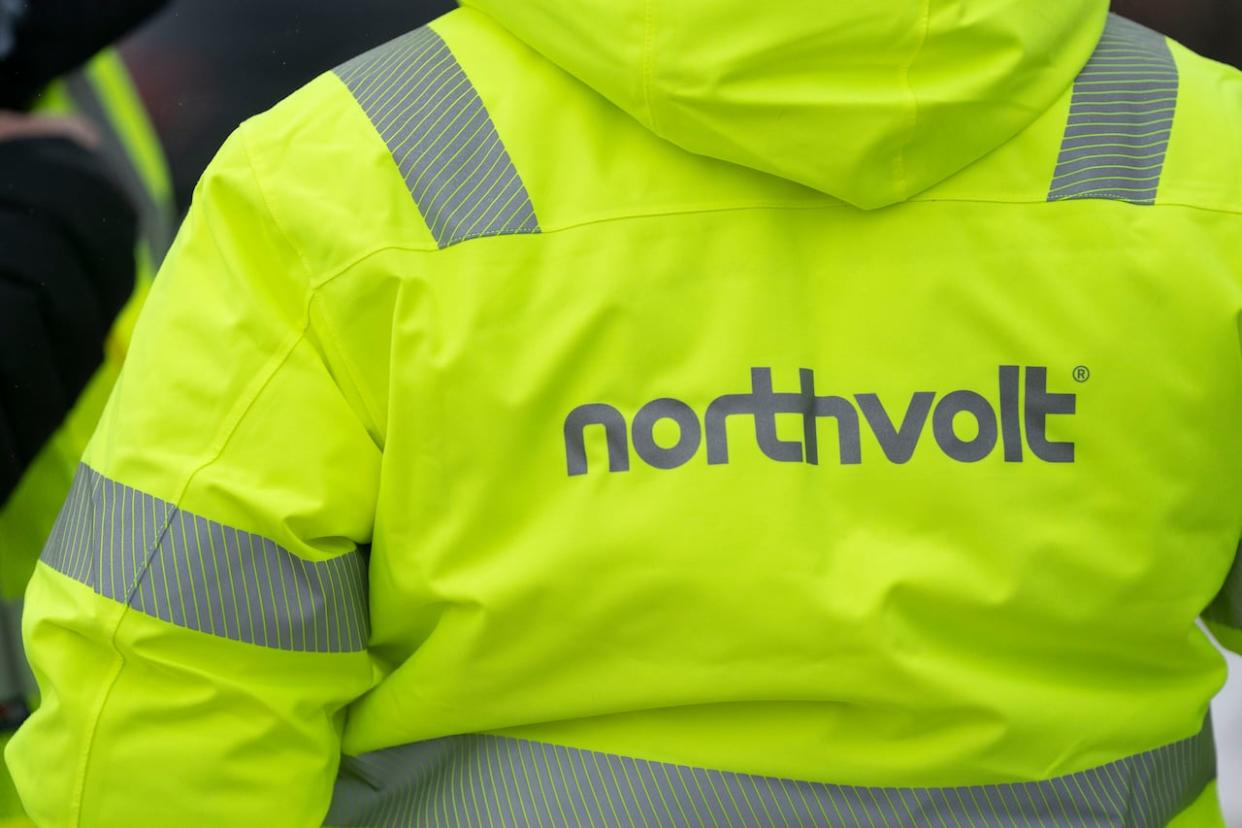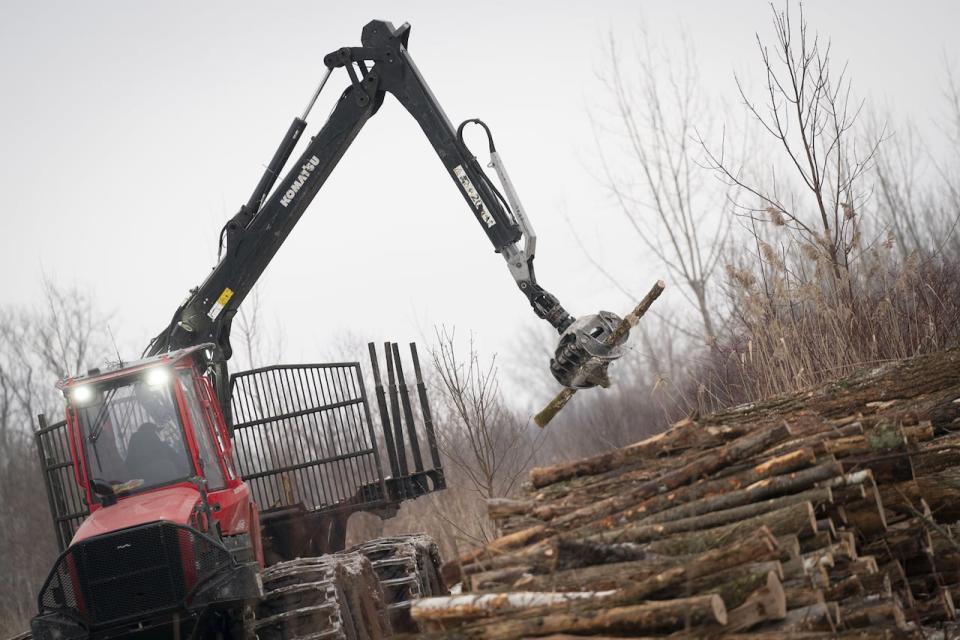Rule change paving way for controversial Northvolt EV battery plant raises transparency concerns in Quebec

- Oops!Something went wrong.Please try again later.
Quebec's environment minister has acknowledged the government changed its rules before approving the building of an electric battery plant and says an evaluation by Quebec's environmental watchdog would have sent Northvolt and its $7-billion project elsewhere.
Experts say this lack of transparency is hurting public trust in the province.
"It's not a good look for the government to be tweaking the rules," said Mark Purdon, the chair in decarbonization at the Université du Québec à Montréal (UQAM).
"It does suggest that there was some fiddling with regulations to let this project go through."
Last February, the province increased the cathodes threshold to trigger an independent environmental review on lithium-ion battery manufacturers from 50,000 to 60,000 tonnes.
A few months later, Northvolt unveiled its plans for the car battery factory, with a production capacity of 56,000 tonnes — something critics say comes across as suspiciously convenient.
The minister, Benoit Charette, says the province's rules were not designed for something like a car-battery factory and so they were changed — but it wasn't specifically to help Northvolt.
"That's what we developed over the last year, but it's not with the intention to favour one company over another," Benoit Charette said on Radio-Canada's Tout un matin.
"It was never the goal to get around the rules and avoid the BAPE."
BAPE offers transparency
Despite being non-binding, an evaluation by the Bureau d'audiences publiques sur l'environnement (BAPE) could help establish trust between the company, the government and the public, Purdon said.
Both Charette and Northvolt say there's a rush to get the project off the ground as soon as possible in the context of a climate crisis and the race toward a green energy transition. Charette says it will also create jobs.
Environmental activists have pushed back against building the Northvolt factory due to the destruction of wetlands and the site's proximity to water, despite the province insisting that producing clean energy would bring it closer to reaching its emissions targets.
Purdon says there are "going to be tradeoffs" when moving away from oil and gas, since society is nowhere near ready to abandon cars.He says the project has potential to contribute to larger-scale decarbonization by producing electric batteries that can be sold all over North America. He also said the land would be hard to use for anything else.
"What the BAPE could allow for is some discussion on what those tradeoffs are, and now we don't have that opportunity because this project was rushed through," said Purdon.

Environment Minister Benoit Charette says Northvolt would have set up shop elsewhere if subjected to a BAPE evaluation. (Ryan Remiorz/The Candian Press)
Charette said the BAPE process can take 18 months, a timeline he says is too long and would discourage companies like Northvolt from setting up shop in Quebec.
The battery giant said it had been "transparent and clear" with both the provincial and federal governments about the "conditions for success linked to our establishment in Quebec," which involved a timeline.
"These deadlines are determined by fierce competition in our industry, while China and the United States heavily subsidize projects like ours," said Laurent Therrien, a spokesperson for Northvolt.
Therrien says the company never asked to modify provincial regulations.
Other evaluation processes in place
Purdon pushed back against Charette's comments and said BAPE evaluations tend to last closer to seven months. The evaluation could have been done even quicker with dedicated human resources, he said.
Charette insists that just because there is no BAPE evaluation, it doesn't mean that there are no environmental assessments at all. For each step, Northvolt will have to get authorization from the Environment Ministry and each time, the evaluation will be precise with clear criteria.
Therrien said Northvolt will conduct all necessary studies and analyses and submit reports to the government. Northvolt's recycling plant, Revolt, will require a BAPE evaluation because its chemical manufacturing meets the threshold for study.

The Northvolt plant will be in Saint-Basile-le-Grand, Que., on land that is currently cleared by the company. (Ivanoh Demers/Radio-Canada)
"The environmental assessment process we follow, as determined by the Quebec government, is strict and rigorous. We fully intend to comply with it — and we already do," he said in a statement.
Critics have blasted the Coalition Avenir Québec (CAQ) government over its handling of the Northvolt file, saying it "knowingly undermined the BAPE in order to put the interests of a foreign multinational first."
"By acting in this way, the CAQ is sabotaging the social acceptability of the project and damaging the image of the battery industry, which is essential to our energy transition," said Haroun Bouazzi, the energy critic with opposition party Québec Solidaire.
He says Charette now has "no choice" but to tell the BAPE to conduct an evaluation.
Virginie Dufour, the Liberal Party's environment critic, said Charette hasn't helped public opinion about the Swedish battery manufacturer by circumventing environmental evaluations.
"Through its lack of transparency, the CAQ is demonstrating that it is Northvolt's worst ally in this project that will benefit our economy," she said.
Dufour said the CAQ is constantly contradicting itself, which undermines trust.
Modifying the BAPE
Charette now says he wants to revamp Quebec's environmental watchdog.
He said he recognizes the importance of BAPE hearings, but the government will look into ways of streamlining the process. He says the goal is "not to lighten the rules," but to make the system "more efficient."
The BAPE said it is mandated by the Environment Ministry and cannot comment on the Northvolt file or the minister's comments.
LISTEN | Why Northvolt and the government want to avoid the BAPE:
Charette acknowledged that the environment ministry previously refused a residential development on the same land as the future Northvolt site following environmental evaluations. But he says the land is very big and the factory's site isn't where the housing project would have been.
The minister stresses that the site is industrial land, and says Northvolt is taking steps to protect part of the land and its biodiversity. The company is also pouring $4.7 million into the government's green fund.
He says the government will review the BAPE's processes in the spring.

